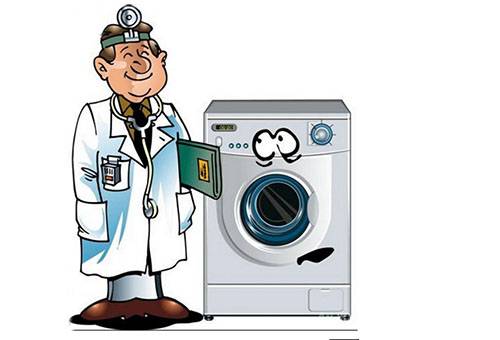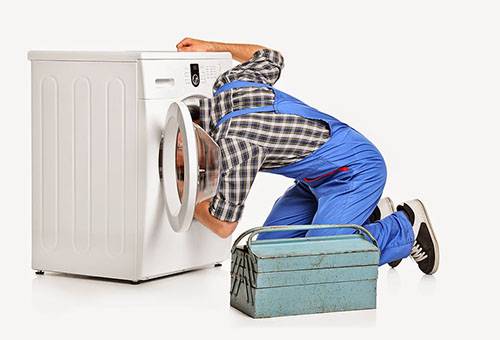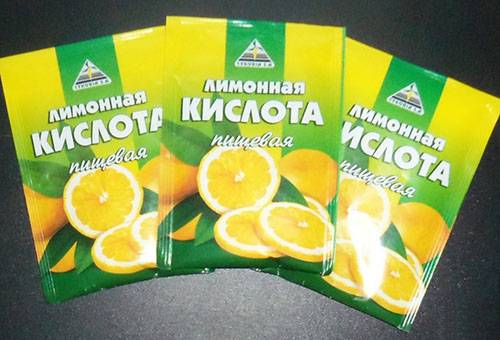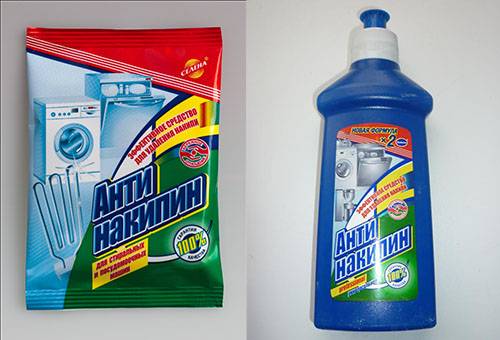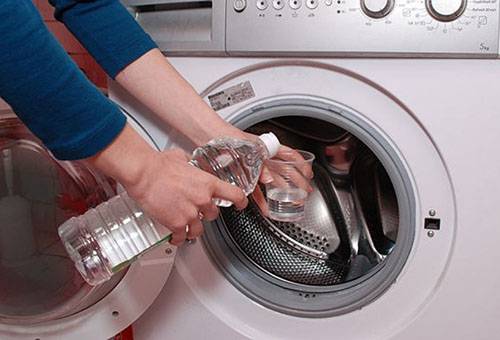How to properly and quickly descale a washing machine at home
Content:
Limescale is a problem in every home, and it should be cleaned regularly. When a person buys a new electric kettle or washing machine, he always expects the item to last a long time. Scale begins to appear on equipment within six months and can render it unusable. You will learn how to clean your washing machine from scale and not be afraid of its further formation.
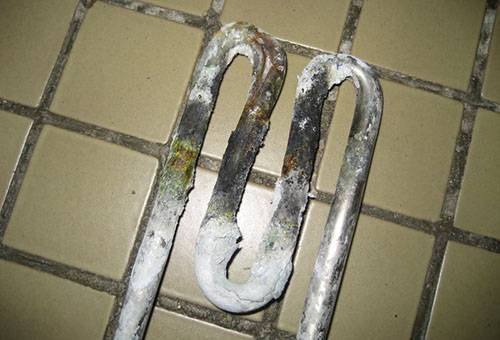
What is scale and where does it come from?
This is a deposit of salts on devices that heat water during operation. In a household there are usually two such devices - a kettle and an automatic washing machine. The main reason for scale formation is too hard water, in which a large amount of magnesium and calcium is dissolved. Especially often, due to hard water, scale forms in residents of apartments connected to a public water supply. Limescale also appears in the washing machine if you wash things with powder containing too many chemical and mineral components. Then its remains are deposited on the heating element and often affect the machine even worse than salts.It’s bad when the “intensive wash” mode is constantly on in the machine. It increases the percentage of salts that fall on the surface and quickly harden.
How does scale harm your washing machine?
Limescale in a washing machine can reduce its service life by one and a half to two times. Moreover, if you were not worried about how to clean the heating element, then you will not have free warranty repairs. The repairmen will conclude that the breakdown occurred due to your carelessness, and you will have to pay a lot.
The main reason for the breakdown of washing machines is that the heating element covered with scale transfers heat less well. Not only does it heat water much more slowly, which leads to loss of electricity, but it also overheats itself. If you clean the machine incorrectly or use the wrong products, then scale will accumulate on the heating element even faster. In addition, if you do not remove the internal contamination of the machine, its outlet valve will become clogged, leak water worse, and break.
How to clean a washing machine?
You can get rid of dirt that gets on the heating element at home or call a professional. The first is more difficult: you need to think about everything, buy funds and act carefully. The second is more expensive and not always reliable. Not all those who call themselves masters are such. Most housewives advise removing scale from the washing machine themselves. After the first independent cleaning, things will go easier, you will know your equipment better and will be sure that you have done everything to make it last longer.
Before you start cleaning, decide what you are going to do it with. Of course, most methods do not require mechanical action, but it is better to grab a good washcloth or clean rag.More than one scale contaminates an automatic washing machine, and the rest of the dirt is much easier to remove. In addition to a washcloth, take good gloves that will protect your hands from strong detergents. If you can't stand chemical smells, check the room where you'll be working.
Advice
It is best to remove dirt from equipment using microfiber cloths. They absorb water and do not leave streaks.
Get ready for the fact that in order to clean the heating element, you will have to turn on the machine “idle” several times. If you don't want to take it apart, there is no other way to get rid of scale. Just in case, take the instructions for using your washing machine.
Cleaning with citric acid
Citric acid is one of the cheapest and most effective methods. To remove dirt from the machine alone, you won’t need even 100 rubles. It’s worth repeating this procedure once every few months, and then your heating element will always be clean. In addition to plaque, citric acid removes unpleasant odors and helps get rid of mold that has found its way deep into the drum.
Take from 60 to 200 grams of citric acid. If it is sold in bags of 15 grams, then it will be from 4 to 14 pieces. But you can also find larger bags, 100 gram bags. The larger the car, the more money is needed. Open all the bags and pour them either into the drum or into the washing powder compartment. You can go there or there. But the main thing is not to pour acid into the rinse aid compartment, be careful. Now close the machine and find the function with the highest temperature. 60 degrees will be enough, but 90 will do. Turn it on, the machine will “wash” for one and a half to two hours.
During this time, the plaque will enter into a chemical reaction with citric acid and begin to fall off or dissolve. After this, it won’t hurt to let the machine “wash” again without laundry, so that the acid and its smell are completely washed out. If after cleaning you look into the pipe of the washing machine, you will see how much dirt will finally be washed off the heating element.
Wash with Antiscale
The principle of operation of this substance is similar to the principle of operation of citric acid, but it is a little more expensive and is designed specifically to clean dirt that gets on the heater or the inside of an electric kettle.
Buy a pack of anti-scale and pour the amount indicated in the instructions into the powder compartment. Turn on idle mode.
Advice
Choose a function with which the wash lasts no longer than 60-70 minutes. This chemical is stronger than acid and can damage the car.
The disadvantage of the product is that if you pour too much of it, it can corrode the rubber parts of the automatic machine. As a result, it will start to leak and will need repairs. Therefore, you need to be very careful with Antiscale.
Vinegar will help a lot
Many housewives say that the vinegar method is the best way to clean the machine. Take one and a half to two glasses of ordinary white vinegar and pour them into the drum. Do not add any more product inside or into the powder compartment. Turn on the washing machine at high temperature and wash for at least an hour and a half. After 10 minutes, press the pause button and let the vinegar get into all the crevices of the drum and hook the ten. The machine should “infuse” for an hour. After this, continue washing. At the end we will need a microfiber cloth. Don't get it wet, just wipe the drum gently.
Is there any benefit to softening chemicals?
We've all seen the Calgon commercials that show a very dirty heating element and heating element after using the product. The second one just shines and looks brand new. It is clear that not everything is so wonderful, and the second ten is actually new, but does Calgon help even a little? The sad answer is no or very little. If you have very hard water, it will reduce the rate of scale formation by 10 percent, no more. At the same time, it costs tens of times more than vinegar or citric acid, which are easy to buy and use at home.
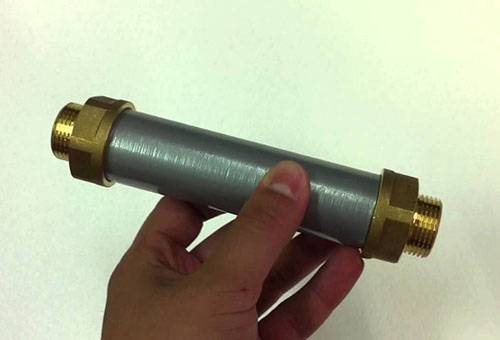
Magnetic water filter
Preventing scale formation
Instead of a chemical softener, you can install a magnetic water softener. It will do some good and is generally cheaper. A water softener will prevent limescale from appearing in your washing machine. After each wash, it is better to wipe the inside of the machine and do not close the door until it is completely dry. After washing clothes with a large amount of washing powder or fabric softener, turn on another rinse, because such products are washed off very slowly.
